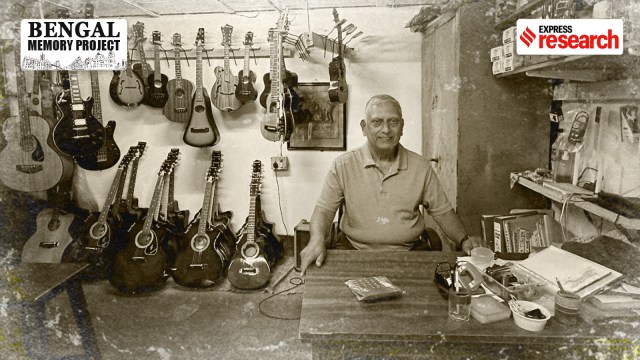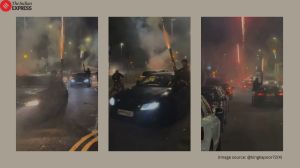Music has long been the soul of Bengal, a region that has given India some of its most iconic musicians and singers. The classical harmonium graces the homes of countless families, and music is woven into the fabric of daily life.
Yet, amidst the Nationalist Movement in 1939, two brothers took on an unlikely path — they opened a store for Western musical instruments. Nearly nine decades later, Dicky Braganza, the second-generation owner, continues to uphold the legacy of his father and uncle. In a world now dominated by fraud and deceit, he runs a business grounded in trust — lending musical instruments at minimal cost.
Looking back on how it all began, what the business means today, and its future in a changing world, Dicky offers a glimpse into an evolving Calcutta, where music and integrity still hold sway.
The Braganza brothers
Seated in one corner of his small shop on Marquis Street in central Calcutta, keeping a watchful eye on the store’s operations while his son is away at lunch, Dicky recounts the story of how it all began. “My dad was born in 1915 in Goa,” he says, his voice tinged with nostalgia. “He lost his father when he was very young, and his mother couldn’t support the family working in the paddy fields. So, at the age of 10, he left Goa.” One of his uncles, a music teacher in Burma (now Myanmar) at the time, invited him to come and learn music. At just 10 years old, he traveled to Burma in 1925, seeking both education and opportunity.
 The showroom (Express photo by Nikita Mohta)
The showroom (Express photo by Nikita Mohta)
This was part of a broader trend that had begun in the late 19th century, when many higher-caste Goans began migrating in search of better job prospects. As noted by J Clement Vaz in Profiles of Eminent Goans: Past and Present, limited educational opportunities and a lack of professional training in Goa led about one-fifth of the Goan population to relocate to cities like Madras (now Chennai), Calcutta, and Delhi, as well as to regions such as Pakistan, Ceylon (now Sri Lanka), and Burma, all of which were part of British India at the time.
However, with the onset of World War II, as the Japanese began bombing Burma, many Goans fled once again. Some sought refuge in Calcutta, while others made their way to Bombay, Chennai, Sri Lanka, and even South Africa. Among them were Francis Xavier Braganza, Dicky’s father, and his uncle, who eventually found their way to Calcutta.
Story continues below this ad
“Another uncle of my father had a music shop just down the road here, called Menezes and Company,” Dicky continues. “He repaired pianos and other instruments, so he invited my dad to join him and learn the business.”
Francis worked there for sometime before deciding to strike out on his own. As he was preparing to marry, he felt it was the right time to start his own venture. “He thought, why work for my uncle when I could open my own shop?” Dicky chuckles. “So, he found this place in 1939 — 2A Marquis Street, which was just a garage back then — and decided to give it a go.” The space Braganza found was owned by the Iran Society of Calcutta. Their generosity allowed Braganza to set up shop there, and a strong bond quickly formed between the two parties. Today, the store remains on the same campus, occupying four rooms: one for the shop and three for repairs.
 Way to the workshop of Braganza & Co. (Express photo by Nikita Mohta)
Way to the workshop of Braganza & Co. (Express photo by Nikita Mohta)
With limited funds to start, Francis began his business on a small scale. As World War II came to an end, many American and British soldiers returned home, often leaving behind their musical instruments. “My dad was known as a talented drummer at some of the best hotels in the city, like the Grand Hotel, and had strong connections with British officers and soldiers,” Dicky recalls. “As the soldiers prepared to head back, they couldn’t take their instruments with them, so they often gave them to my dad — mostly for free. Pianos, guitars, anything they couldn’t carry — he received these instruments almost without cost.”
In 1939, with the onset of World War II, the Grand Hotel opened its doors to accommodate the British and American armies, who flooded into Calcutta to protect the city from a potential Japanese attack. The Americans were eager to connect with locals over food, drinks, and music. Jazz, introduced by the soldiers, quickly gained popularity in the city, and jazz nights at the Grand Hotel became a hit, bringing together soldiers, locals, and musicians such as Francis.
Story continues below this ad
“Though he didn’t have much to start with, my dad was able to rent out the instruments at minimal rates — perhaps 10 rupees a month,” Dicky recalls. “Soon, though, he realised he needed help,” he adds. “His brother, Thomas Braganza, who was working in Bangalore, came down to Calcutta, and together, they expanded the business.”
From humble beginnings, the Braganza family’s musical legacy gradually expanded. For two decades, business flourished, until the 1960s, when a communist takeover of the city brought significant changes to its bars and restaurants. “Most of the restaurants along Park Street that once played English music and rented our instruments either stopped featuring music altogether or switched to Hindi songs,” Dicky explains. “As a result, the demand for violins and pianos in the city plummeted. That was the one time our business took a hit.” However, the rise of the Anglo-Indian community and convent schools in the city shifted the Braganza family’s clientele. “Music never dies; it grows on people,” he smiles.
The father-son duo today
Dicky Braganza was born in Calcutta in 1949 and attended St. Xavier’s Collegiate School, later continuing his studies at the college. He then joined the Reserve Bank of India, where he worked for nearly 30 years. However, when his father passed away in 2001, Dicky left his job to join the family business. “My father built this business from scratch, so I wanted to keep the Braganza name flying high,” he says with pride.
Slowly, Dicky expanded the business, moving beyond just instrument rentals to include repairs. They began with pianos and later started fixing violins as well. One of their oldest and most notable customers was Satyajit Ray, whose house still rents a piano from the Braganzas. Dicky laughs as he recalls, “We’ve never increased our rates. We tell our customers to continue paying what they’ve been paying all these years.”
Story continues below this ad
 A piano getting polished at Braganza & Co. (Express photo by Nikita Mohta)
A piano getting polished at Braganza & Co. (Express photo by Nikita Mohta)
He explains the importance of their rental service: “The advantage of hiring is that, say you have a child who wants to learn the violin — rather than buying one, you can just hire. If they change their mind, it won’t hurt your pocket.”
Interestingly, the Lalbazaar area in Central Calcutta is home to some of the city’s oldest classical instrument shops. However, Dicky mentions that both Western and Indian music have been equally appreciated in the city, with residents never showing bias towards one over the other.
A well-known violinist himself, Dicky often helps customers select violins. He explains the differences in quality and price between various violins. “Some ask why this one is 5,000, that one is 10,000, and another is 50,000. I play them and show them the difference, so they understand the intricacies.”
Though Dicky has now retired, he still visits the store during lunch while his son takes a break. Third-generation owner Nigel Braganza has followed in his father’s footsteps, carrying on the family legacy. “It’s the love for music and the desire to share it with the city that drew my son into this too,” Dicky says with a smile.
Story continues below this ad
He proudly walks around the workshop, where music is made and instruments are repaired. Like the Braganza family, the artisans here are generational craftsmen. But Dicky worries about the future. “I don’t know if his son, pointing to a craftsman repairing a piano, will want to continue the tradition.”
 Craftsmen at Braganza & Co. (Express photo by Nikita Mohta)
Craftsmen at Braganza & Co. (Express photo by Nikita Mohta)
The weathered board outside 2A Marquis Street, emblazoned with Braganza & Co., stands as a silent testament to the enduring legacy of the business. “Not much has changed over the years, except for the beams,” he remarks. “With the shifting seasons, we’re forced to replace them year after year — if not, the roof would fall in. But the heart of the place remains the same. People come for the music, yes, but it’s more than that. This shop is a repository of memories, a sanctuary where pieces of the past linger in the air,” he sighs.
 Braganza & Co, 2A Marquis Street (Express photo by Nikita Mohta)
Braganza & Co, 2A Marquis Street (Express photo by Nikita Mohta)
Asked about the future of the store amid growing competition, Dicky’s response is unwavering, “As I’ve always said, music and trust will forever prevail in Calcutta.”



 The showroom (Express photo by Nikita Mohta)
The showroom (Express photo by Nikita Mohta) Way to the workshop of Braganza & Co. (Express photo by Nikita Mohta)
Way to the workshop of Braganza & Co. (Express photo by Nikita Mohta) A piano getting polished at Braganza & Co. (Express photo by Nikita Mohta)
A piano getting polished at Braganza & Co. (Express photo by Nikita Mohta) Craftsmen at Braganza & Co. (Express photo by Nikita Mohta)
Craftsmen at Braganza & Co. (Express photo by Nikita Mohta) Braganza & Co, 2A Marquis Street (Express photo by Nikita Mohta)
Braganza & Co, 2A Marquis Street (Express photo by Nikita Mohta)





























